On 26 May Britain and Russia signed the Anglo-Soviet Treaty, in which each party agreed not to make a separate peace without the other. Also on 26 May, Rommel launched a major offensive at Gazala in the Western Desert, west of Tobruk. He initially broke through the British lines but ran into stiff resistance, and formed his troops into a defensive position known as “The Cauldron” to regroup; he resumed the attack on 30 May. Finally this week, on the night of 30-31 May the RAF launched the first “thousand bomber raid”, with Cologne as its target.
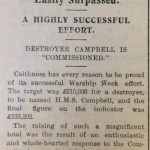 Last week Caithness had celebrated Warship Week, a series of events across the county to raise funds for a new destroyer to be named after the late Major Jock Campbell of Thurso. Now the John O’Groat Journal reported, “Caithness has every reason to be proud of its successful Warship Week effort. The target was £210,000 for a destroyer, to be named H.M.S. Campbell, and the final figure on the indicator was £233,202.” The headline read, “Destroyer Campbell is Commissioned.”
Last week Caithness had celebrated Warship Week, a series of events across the county to raise funds for a new destroyer to be named after the late Major Jock Campbell of Thurso. Now the John O’Groat Journal reported, “Caithness has every reason to be proud of its successful Warship Week effort. The target was £210,000 for a destroyer, to be named H.M.S. Campbell, and the final figure on the indicator was £233,202.” The headline read, “Destroyer Campbell is Commissioned.”
On 26 May Ackergill School received its H.M. Inspector’s Report. The school had been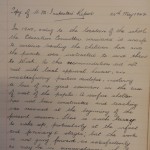 closed in 1940 because it lay so close to Wick airfield, and was therefore at risk of enemy bombing. The report noted that “the parents were instructed to send their children to Wick. As this recommendation did not meet with local approval, however, an unsatisfactory position developed, involving a loss of one year’s education in the case of most of the pupils.” A surface shelter had been built and the schooling resumed. But “There is much leeway to make up … but the work is now going forward as satisfactorily as may be in the circumstances which involve considerable strain on all concerned.”
closed in 1940 because it lay so close to Wick airfield, and was therefore at risk of enemy bombing. The report noted that “the parents were instructed to send their children to Wick. As this recommendation did not meet with local approval, however, an unsatisfactory position developed, involving a loss of one year’s education in the case of most of the pupils.” A surface shelter had been built and the schooling resumed. But “There is much leeway to make up … but the work is now going forward as satisfactorily as may be in the circumstances which involve considerable strain on all concerned.”
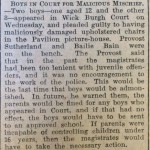 The phrase “malicious mischief” crops up regularly in the police records, but these days it’s hard to know just what it meant. The John O’Groat Journal reported this week, however, that two boys had appeared in court for just such an offence – in this instance, “having maliciously damaged upholstered chairs in the Pavilion picture-house.” The boys were aged 8 and 12 and the magistrates let them off with being admonished, adding that “in the past [they] had been too lenient with juvenile offenders” and that in future the parents would be fined.
The phrase “malicious mischief” crops up regularly in the police records, but these days it’s hard to know just what it meant. The John O’Groat Journal reported this week, however, that two boys had appeared in court for just such an offence – in this instance, “having maliciously damaged upholstered chairs in the Pavilion picture-house.” The boys were aged 8 and 12 and the magistrates let them off with being admonished, adding that “in the past [they] had been too lenient with juvenile offenders” and that in future the parents would be fined.
Donald Maclean, a farm worker in his twenties, notified the police on 25 May that he’d “discovered what he took 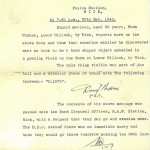 to be a bomb shaped object embedded in a grazing field on the farm at Lower Gillock, by Wick. The only thing visible was part of the tail and a circular piece of brass with the following thereon:- D.1473” (The report includes a laconic response from the Bomb Disposal Unit that “there was no immediate hurry and that they would go there tomorrow morning.”)
to be a bomb shaped object embedded in a grazing field on the farm at Lower Gillock, by Wick. The only thing visible was part of the tail and a circular piece of brass with the following thereon:- D.1473” (The report includes a laconic response from the Bomb Disposal Unit that “there was no immediate hurry and that they would go there tomorrow morning.”)
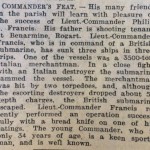 Finally this week, the John O’Groat Journal celebrated the military successes of Lieut,-Commander Philip S. Francis, whose father was shooting tenant at Rogart. Lieut.-Commander Francis, who was just 34, had the command of a British submarine and had already sunk three ships and rammed an Italian destroyer. But the report saves the best till last: after listing these successes, it casually mentions that he “recently performed an operation successfully with a bread knife on one of his ratings”!
Finally this week, the John O’Groat Journal celebrated the military successes of Lieut,-Commander Philip S. Francis, whose father was shooting tenant at Rogart. Lieut.-Commander Francis, who was just 34, had the command of a British submarine and had already sunk three ships and rammed an Italian destroyer. But the report saves the best till last: after listing these successes, it casually mentions that he “recently performed an operation successfully with a bread knife on one of his ratings”!
